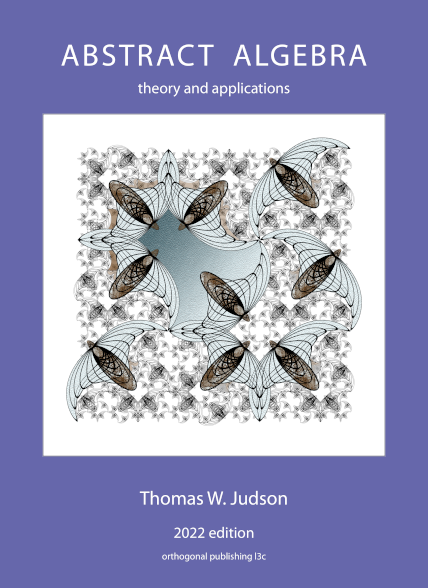Exercises 23.5 Exercises
1.
Compute each of the following Galois groups. Which of these field extensions are normal field extensions? If the extension is not normal, find a normal extension of \({\mathbb Q}\) in which the extension field is contained.
\(\displaystyle G({\mathbb Q}(\sqrt{30}\, ) / {\mathbb Q})\)
\(\displaystyle G({\mathbb Q}(\sqrt[4]{5}\, ) / {\mathbb Q})\)
\(\displaystyle G( {\mathbb Q}(\sqrt{2}, \sqrt{3}, \sqrt{5}\, )/ {\mathbb Q} )\)
\(\displaystyle G({\mathbb Q}(\sqrt{2}, \sqrt[3]{2}, i) / {\mathbb Q})\)
\(\displaystyle G({\mathbb Q}(\sqrt{6}, i) / {\mathbb Q})\)
2.
Determine the separability of each of the following polynomials.
\(x^3 + 2 x^2 - x - 2\) over \({\mathbb Q}\)
\(x^4 + 2 x^2 + 1\) over \({\mathbb Q}\)
\(x^4 + x^2 + 1\) over \({\mathbb Z}_3\)
\(x^3 +x^2 + 1\) over \({\mathbb Z}_2\)
3.
Give the order and describe a generator of the Galois group of \(\gf(729)\) over \(\gf(9)\text{.}\)
4.
Determine the Galois groups of each of the following polynomials in \({\mathbb Q}[x]\text{;}\) hence, determine the solvability by radicals of each of the polynomials.
\(\displaystyle x^5 - 12 x^2 + 2\)
\(\displaystyle x^5 - 4 x^4 + 2 x + 2\)
\(\displaystyle x^3 - 5\)
\(\displaystyle x^4 - x^2 - 6\)
\(\displaystyle x^5 + 1\)
\(\displaystyle (x^2 - 2)(x^2 + 2)\)
\(\displaystyle x^8 - 1\)
\(\displaystyle x^8 + 1\)
\(\displaystyle x^4 - 3 x^2 -10\)
5.
Find a primitive element in the splitting field of each of the following polynomials in \({\mathbb Q}[x]\text{.}\)
\(\displaystyle x^4 - 1\)
\(\displaystyle x^4 - 8 x^2 + 15\)
\(\displaystyle x^4 - 2 x^2 - 15\)
\(\displaystyle x^3 - 2\)
6.
Prove that the Galois group of an irreducible quadratic polynomial is isomorphic to \({\mathbb Z}_2\text{.}\)
7.
Prove that the Galois group of an irreducible cubic polynomial is isomorphic to \(S_3\) or \({\mathbb Z}_3\text{.}\)
8.
Let \(F \subset K \subset E\) be fields. If \(E\) is a normal extension of \(F\text{,}\) show that \(E\) must also be a normal extension of \(K\text{.}\)
9.
Let \(G\) be the Galois group of a polynomial of degree \(n\text{.}\) Prove that \(|G|\) divides \(n!\text{.}\)
10.
Let \(F \subset E\text{.}\) If \(f(x)\) is solvable over \(F\text{,}\) show that \(f(x)\) is also solvable over \(E\text{.}\)
11.
Construct a polynomial \(f(x)\) in \({\mathbb Q}[x]\) of degree \(7\) that is not solvable by radicals.
12.
Let \(p\) be prime. Prove that there exists a polynomial \(f(x) \in{\mathbb Q}[x]\) of degree \(p\) with Galois group isomorphic to \(S_p\text{.}\) Conclude that for each prime \(p\) with \(p \geq 5\) there exists a polynomial of degree \(p\) that is not solvable by radicals.
13.
Let \(p\) be a prime and \({\mathbb Z}_p(t)\) be the field of rational functions over \({\mathbb Z}_p\text{.}\) Prove that \(f(x) = x^p - t\) is an irreducible polynomial in \({\mathbb Z}_p(t)[x]\text{.}\) Show that \(f(x)\) is not separable.
14.
Let \(E\) be an extension field of \(F\text{.}\) Suppose that \(K\) and \(L\) are two intermediate fields. If there exists an element \(\sigma \in G(E/F)\) such that \(\sigma(K) = L\text{,}\) then \(K\) and \(L\) are said to be conjugate fields. Prove that \(K\) and \(L\) are conjugate if and only if \(G(E/K)\) and \(G(E/L)\) are conjugate subgroups of \(G(E/F)\text{.}\)
15.
Let \(\sigma \in \aut( {\mathbb R} )\text{.}\) If \(a\) is a positive real number, show that \(\sigma( a) > 0\text{.}\)
16.
Let \(K\) be the splitting field of \(x^3 + x^2 + 1 \in {\mathbb Z}_2[x]\text{.}\) Prove or disprove that \(K\) is an extension by radicals.
17.
Let \(F\) be a field such that \(\chr(F) \neq 2\text{.}\) Prove that the splitting field of \(f(x) = a x^2 + b x + c\) is \(F( \sqrt{\alpha}\, )\text{,}\) where \(\alpha = b^2 - 4ac\text{.}\)
18.
Prove or disprove: Two different subgroups of a Galois group will have different fixed fields.
19.
Let \(K\) be the splitting field of a polynomial over \(F\text{.}\) If \(E\) is a field extension of \(F\) contained in \(K\) and \([E:F] = 2\text{,}\) then \(E\) is the splitting field of some polynomial in \(F[x]\text{.}\)
20.
We know that the cyclotomic polynomial
is irreducible over \({\mathbb Q}\) for every prime \(p\text{.}\) Let \(\omega\) be a zero of \(\Phi_p(x)\text{,}\) and consider the field \({\mathbb Q}(\omega)\text{.}\)
Show that \(\omega, \omega^2, \ldots, \omega^{p-1}\) are distinct zeros of \(\Phi_p(x)\text{,}\) and conclude that they are all the zeros of \(\Phi_p(x)\text{.}\)
Show that \(G( {\mathbb Q}( \omega ) / {\mathbb Q} )\) is abelian of order \(p - 1\text{.}\)
Show that the fixed field of \(G( {\mathbb Q}( \omega ) / {\mathbb Q} )\) is \({\mathbb Q}\text{.}\)
21.
Let \(F\) be a finite field or a field of characteristic zero. Let \(E\) be a finite normal extension of \(F\) with Galois group \(G(E/F)\text{.}\) Prove that \(F \subset K \subset L \subset E\) if and only if \(\{ \identity \} \subset G(E/L) \subset G(E/K) \subset G(E/F)\text{.}\)
22.
Let \(F\) be a field of characteristic zero and let \(f(x) \in F[x]\) be a separable polynomial of degree \(n\text{.}\) If \(E\) is the splitting field of \(f(x)\text{,}\) let \(\alpha_1, \ldots, \alpha_n\) be the roots of \(f(x)\) in \(E\text{.}\) Let \(\Delta = \prod_{i \lt j} (\alpha_i - \alpha_j)\text{.}\) We define the discriminant of \(f(x)\) to be \(\Delta^2\text{.}\)
If \(f(x) = x^2 + b x + c\text{,}\) show that \(\Delta^2 = b^2 - 4c\text{.}\)
If \(f(x) = x^3 + p x + q\text{,}\) show that \(\Delta^2 = - 4p^3 - 27q^2\text{.}\)
Prove that \(\Delta^2\) is in \(F\text{.}\)
If \(\sigma \in G(E/F)\) is a transposition of two roots of \(f(x)\text{,}\) show that \(\sigma( \Delta ) = -\Delta\text{.}\)
If \(\sigma \in G(E/F)\) is an even permutation of the roots of \(f(x)\text{,}\) show that \(\sigma( \Delta ) = \Delta\text{.}\)
Prove that \(G(E/F)\) is isomorphic to a subgroup of \(A_n\) if and only if \(\Delta \in F\text{.}\)
Determine the Galois groups of \(x^3 + 2 x - 4\) and \(x^3 + x -3\text{.}\)
